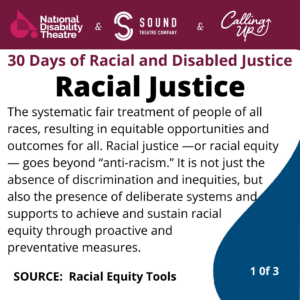RACIAL JUSTICE
Racial justice is the systematic fair treatment of people of all races, resulting in equitable opportunities and outcomes for all. Racial justice —or racial equity — goes beyond “anti-racism.” It is not just the absence of discrimination and inequities, but also the presence of deliberate systems and supports to achieve and sustain racial equity through proactive and preventative measures.
Operationalizing racial justice means reimagining and co-creating a just and liberated world and includes:
Centering Blackness and building community, cultural, economic, and political power of Black, Indigenous, and other People of Color (BIPOC), and
Understanding the history and the system of white supremacy
Addressing past harms of supremacy culture
Working in right relationship and accountability in an ecosystem for collective change
Implementing interventions that use intersectional analysis impacting multiple systems
Applying the practice of love along with disruption and resistance to the status quo
Source: https://www.racialequitytools.org/glossary
Link to Additional Resources
Image Description: Black text on white background with National Disability Theater, Sound Theater, and Calling Up Justice logos.
FURTHER READING
Race Forward, “Race Reporting Guide” (2015)
https://www.raceforward.org/reporting-guide
Racial Justice in Education Resource Guide
https://neaedjustice.org/wp-content/uploads/2018/11/Racial-Justice-in-Education.pdf
Maggie Potapchuk, “Operationalizing Racial Justice in Non-Profit Organizations” (MP Associates, 2020)
What is Justice? From team rePower https://repower.org/what-is-justice/
This definition is based on and expanded from the one described in Rinku Sen and Lori Villarosa, “Grantmaking with a Racial Justice Lens: A Practical Guide” (Philanthropic Initiative for Racial Equity, 2019) https://racialequity.org/grantmaking-with-a-racial-justice-lens/

